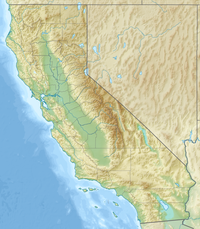Mount Irvine is a mountain in the Sierra Nevada of California. The summit is in the Inyo National Forest and the John Muir Wilderness. The peak was named in memory of Andrew Irvine, of the 1924 British Mount Everest expedition, who perished on Mount Everest, June, 1924. Norman Clyde proposed Irvine's and George H. Leigh Mallory's names following their loss after attaining the highest altitude reached by a mountaineer.[5][6]
| Mount Irvine | |
|---|---|
 Mt. Irvine centered, from Mt. Whitney | |
| Highest point | |
| Elevation | 13,786+ ft (4222+ m) NAVD 88[1] |
| Prominence | 197 ft (60 m)[1] |
| Parent peak | Mount Mallory[2] |
| Listing |
|
| Coordinates | 36°33′21″N 118°15′49″W / 36.5559097°N 118.2635395°W[5] |
| Geography | |
| Location | Inyo County, California, U.S. |
| Parent range | Sierra Nevada |
| Topo map | USGS Mount Whitney |
| Climbing | |
| First ascent | 1925 by Norman Clyde[6] |
| Easiest route | Southeast Slope, class 2[3] |
Geography
editMount Irvine is located southeast of Mount Whitney, and is flanked to the south by Mount Mallory. The summit is a quarter mile east of the Sierra Crest, in Inyo County.
Climbing
editThere are several routes typically used to climb Mount Irvine. The southeast slope, reached from Richins Pass, presents the most obvious route, but the mountain is often climbed in conjunction with Mount Mallory by way of a class 2 traverse.[7]
See also
editReferences
edit- ^ a b "Mount Irvine, California". Peakbagger.com. Retrieved 2014-01-18.
- ^ "Arc Pass". Peakbagger.com. Retrieved 2014-01-18.
- ^ a b "Sierra Peaks Section List" (PDF). Angeles Chapter, Sierra Club. Retrieved 2009-09-11.
- ^ "Western States Climbers Qualifying Peak List". Retrieved 2016-03-24.
- ^ a b "Mount Irvine". Geographic Names Information System. United States Geological Survey, United States Department of the Interior. Retrieved 2021-11-22.
- ^ a b Farquhar, Francis P. (1926). Place Names of the High Sierra. San Francisco: Sierra Club. Retrieved 2009-09-11.
- ^ Secor, R.J. (2009). The High Sierra Peaks, Passes, and Trails (3rd ed.). Seattle: The Mountaineers. pp. 60–61. ISBN 978-0898869712.
External links
edit- "Mount Irvine". SummitPost.org.
